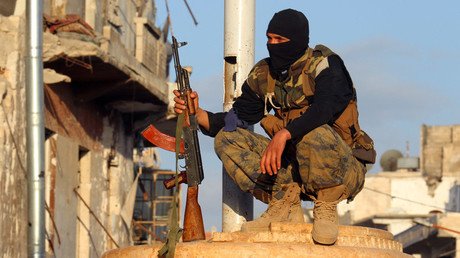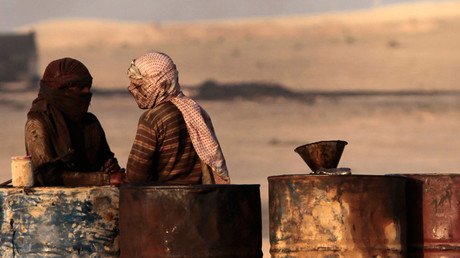ISIS releases footage of its 'police' patrolling Libya streets
Islamic State (IS, formerly ISIS/ISIL) has released footage of their security forces on the streets of Sirte in Libya - the so-called ‘Islamic Police’.
The terrorist group is trying to take over more Libyan territories, as the West eyes a possible intervention for the second time in five years.
The footage is reportedly aimed at showing off IS control over Sirte.
The terror group now holds territories far beyond Syria and Iraq, something raising concern across the world.
“In Iraq and Syria, ISIL has suffered significant setbacks. It doesn’t mean that they don’t remain a threat. They do. <…> We’ve seen them try to get a toehold in North Africa,” US State Department spokesman John Kirby said during the latest press briefing.
His fears are echoed by other US officials.
Earlier, US Defense Secretary Ashton Carter compared Islamic State’s presence in the Middle East with a “growing tumor.”
“Even as we work to defeat ISIL in Syria and Iraq, where its parent tumor has grown, we also recognize ISIL has metastasized elsewhere” Carter said.
The UN has voiced its concerns about the rapid spread of the terrorist group in its latest report on the IS threat in Libya.
“While currently concentrated in its stronghold in Sirte, ISIL could seek local alliances to expand its territorial control, also entailing the risk of motivating additional foreign terrorist fighters to join the group in Libya,” the report read.
At the moment, the IS presence in Libya is mostly limited to areas around their stronghold in Sirte, but the group is currently battling to take over the strategic port city of Ajdabiya. Should it fall, the terrorists would have access to Libya’s largest oil hub.
The international community is on standby across the Mediterranean, but neither of the Libyan governments - the official one in Tobruk or the self-proclaimed version in Tripoli - wants to allow any US-led operations.
However, the Tripoli government could go to Russia for help, requesting the Russian military to hit IS targets, RIA Novosti reported citing the Foreign Ministry in Tripoli.
“This decision could be made when the Government of National Accord is formed. We’re now striving to form such a government,” Foreign Minister Ali Abu Zaakouk said, days after the country’s rival parliaments finally signed the unity government deal.
Despite local officials refusing the idea of another US-led intervention, a few days ago, the Pentagon admitted a US special forces unit had been deployed in Libya for a secret operation.
The fact of the unit's presence emerged after photos appeared on the Libyan Air Force's Facebook page, with 20 US combat-ready troops arriving in a Libyan air base last Monday.
They were turned back by local commanders, who refused to authorize any operation. The Pentagon said their mission had been focused on attempting dialogue with the Libyan National Army.
If the West gets Libya's okay to launch a combat mission against ISIL, it would be the second time in five years that the international community has intervened in Libya.
In 2011, President Obama said the operation in Libya was “the task that must be the work of all of us – supporting the people of Libya, as they build the future that is free, and democratic, and prosperous”.
Four years later, the US president spoke about the problems linked to the campaign, which have led to the country’s current war-torn state.
“There was a failure on the part of the entire international community, and I think that the US has some accountability for not moving swiftly enough and underestimating the need to re-build the government there quickly,” Obama said a few days ago.














